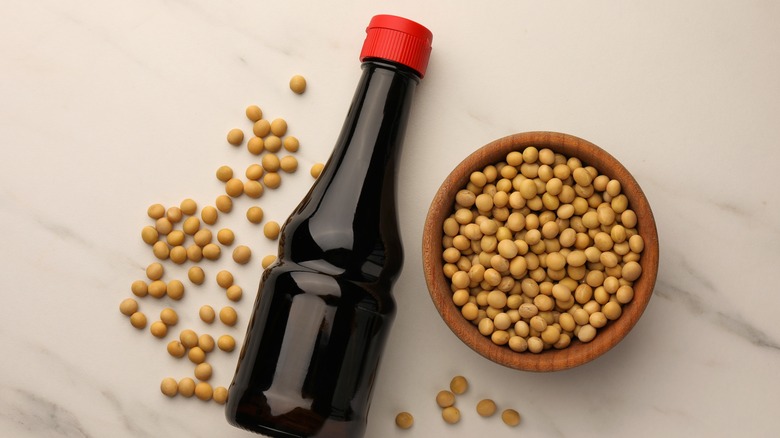Should Soy Sauce Be Stored In The Fridge Or On The Counter?
Condiments can be rather tricky to store. Ones like mustard and mayonnaise don't need to be refrigerated until they are opened, whereas others like ranch need to be kept in the fridge from the get go. Then there are those like honey which actually don't fair well in cold temperatures, and are best left on the counter. So, where does soy sauce stand? Well, it can be stored in either place, but the answer isn't super straightforward.
Soy sauce has been around since far before refrigerators were even invented, so the condiment has been stored at room temperature throughout history. This is because it is a shelf-stable liquid made by fermenting soybeans with salt, which is a natural preservative. The sodium makes it very hard for harmful bacteria to thrive in perishable items. Plus, many store-bought soy sauces also contain sodium benzoate, which is another food preservative used to extend the lifespan of packaged foods.
As a result, soy sauce can be safely kept on the counter even after it is opened — as long as you don't add extra water or any ingredients that are prone to spoilage. Just make sure to keep the liquid in a cool, dry, and dark place away from direct sunlight.
Why you should consider storing soy sauce in the refrigerator anyway
The question of refrigerator versus counter when it comes to soy sauce isn't so much about safety as it is about quality. All types of soy sauce begin to oxidize once they are opened, which causes their flavor and color to change. The liquid becomes darker, its aroma gets stronger, and it also loses freshness over time. By around the three to six month mark, much of soy sauce's more subtle and delicate flavors evaporate. It is still okay to use in robust dishes like stews, but you won't quite enjoy its finer, more complex flavors after this point.
This process happens even more quickly if your soy sauce is in a plastic bottle rather than a glass one, as the former is more susceptible to oxidation. It's the same reason why you shouldn't be storing olive oil in plastic bottles, either.
The low temperature of a refrigerator slows down the rate at which soy sauce oxidizes and preserves its quality for longer — at least for six months, if not more. This is why it's a good idea to store soy sauce in the refrigerator once it is opened, especially if you don't plan to use it up within a few months. If you're unsure of your soy sauce's quality, always check for signs of oxidation before you use it. Observe its consistency, too: If your soy sauce seems more thick than runny, it's time to replace the bottle.


